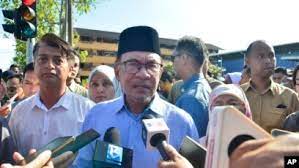Kuala Lumpur (Reuters): Malaysians in six states headed to the polls on Saturday in regional elections seen as a major test of support for Prime Minister Anwar Ibrahim’s nine-month old administration.
The election in the states of Selangor, Penang, Negeri Sembilan, Kelantan, Terengganu and Kedah will not directly impact Anwar’s two-thirds majority in parliament, but any significant losses could threaten the stability of his coalition government.
Anwar’s progressive, multi-ethnic alliance Pakatan Harapan currently holds power in three of the six states, with the rest controlled by Perikatan Nasional, a conservative opposition bloc that is increasingly popular with the country’s majority ethnic-Malay Muslims.
Perikatan, led by former prime minister Muhyiddin Yassin, made significant inroads in the Malay heartlands in the last national election in November 2022.
It has portrayed itself as clean of corruption, and has strongly criticised Anwar for forming an alliance with his coalition’s former rival, the graft-tainted United Malays National Organisation, in order to gain a majority in parliament.
Opinion surveys conducted ahead of Saturday’s polling showed both Anwar and Muhyiddin’s blocs were expected to retain control in the respective states, with Perikatan likely expanding their support in Malay-majority areas across all six states.
The surveys by polling groups Merdeka Centre and Ilham Centre also showed strong concerns among voters over economic issues such as rising prices, slowing growth, and a weakening ringgit.
Asyraf Zainal Ludin, a 28-year-old Malay voter in the Selangor district of Selayang, said he hoped initiatives announced by Anwar’s government would be able to turn around the economy.
“Hopefully whoever wins can make changes to this country, especially in Selayang where I have been born and raised all my life,” he told Reuters outside a polling station on Saturday.
Since coming to power, Anwar has focused on introducing economic and institutional reforms, including reducing subsidies for the wealthy, easing listing rules for companies, and abolishing the mandatory death penalty.
Critics, however, have raised concerns over increasing government scrutiny on online content and growing intolerance against the country’s LGBTQ community. Anwar has said LGBTQ rights will not be recognised by his administration.







